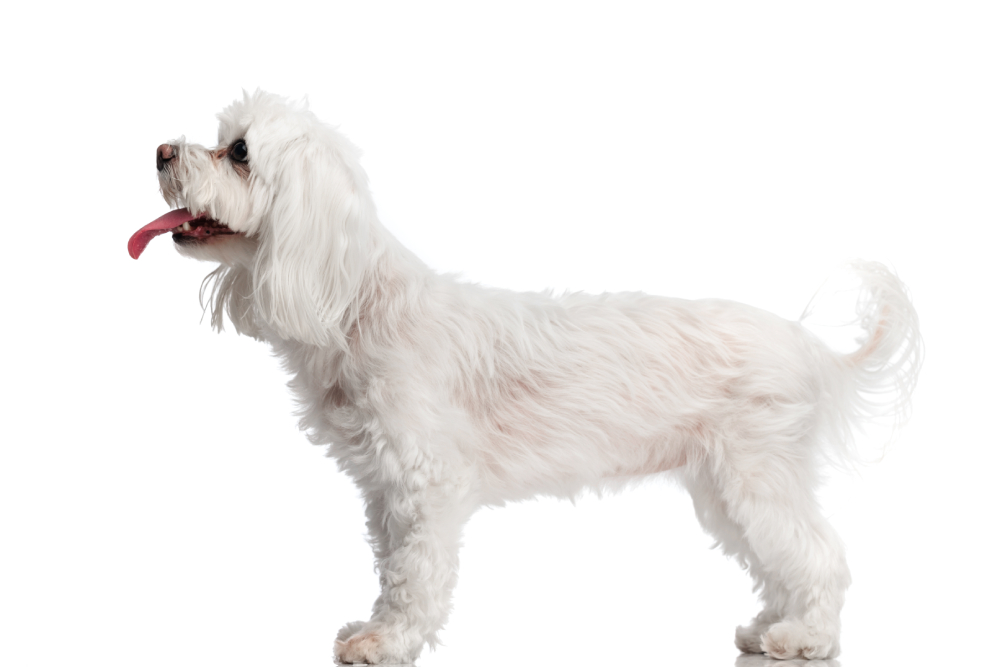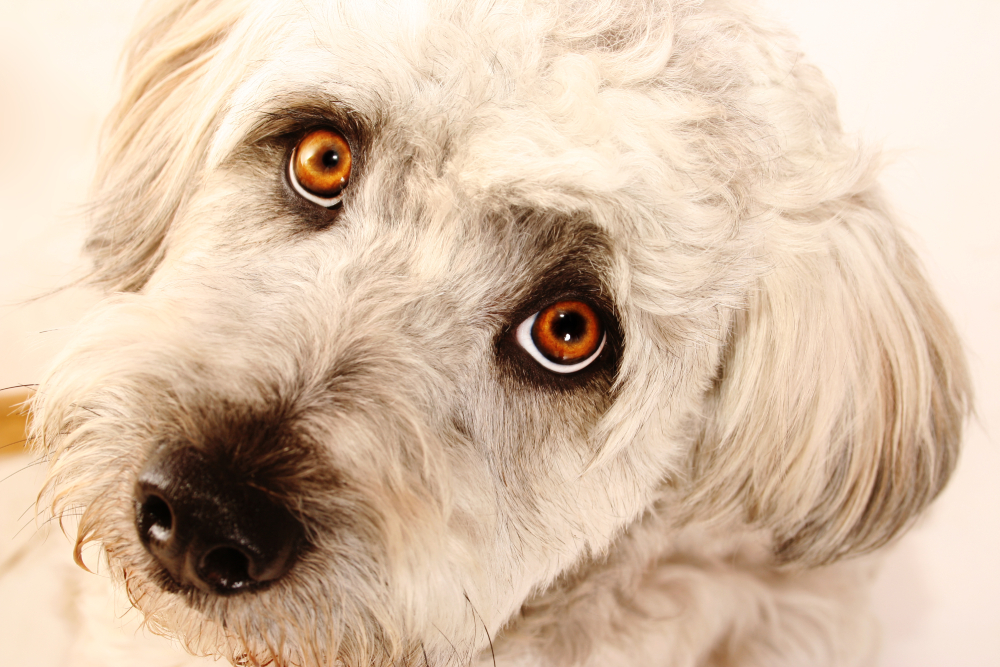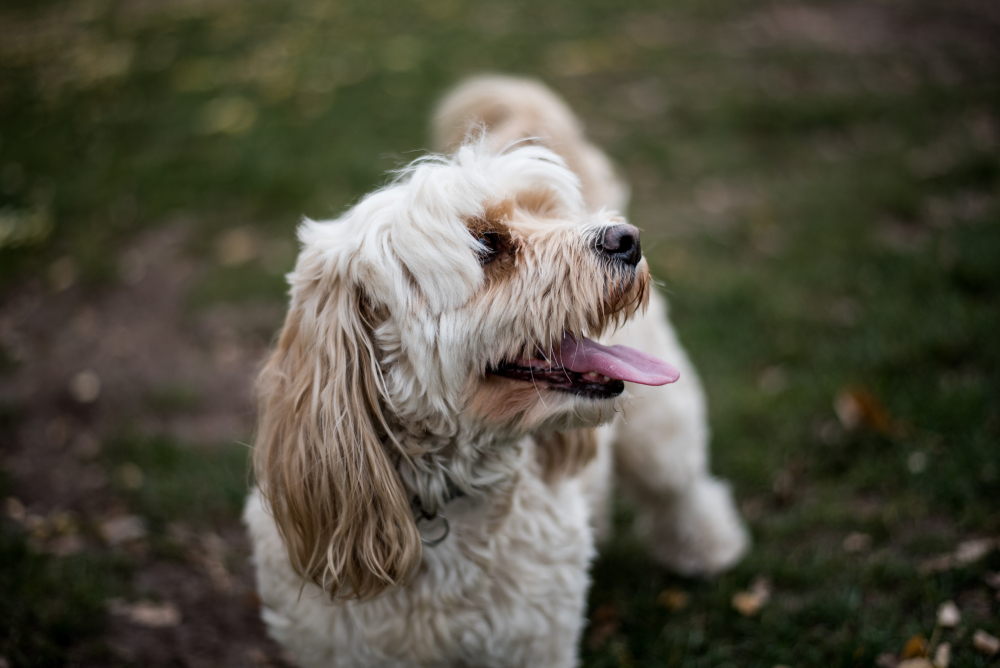Click Below to Skip Ahead
Please Note
The Afghan Chon dog is a relatively new crossbreed with no published breed standards in any notable international dog registry. As such, the appearance of this crossbreed is considered relatively unpredictable. The photographs used in this article intend to show an approximation of their appearance, or are photographs of individuals that are claimed to be an Afghan Chon dog by the source. As more information about the breed comes forward, we may revise the images for better accuracy.
When the elegant Afghan Hound is crossed with the social Bichon Frise, the resulting Afghan Chon presents a unique personality all their own. Here is a rare cross drawing on an unlikely combination of vastly different personalities and body types. As a result, it can be difficult to tell what you’ll get in your mixed-breed puppy, but we’ll help you prepare as much as possible with this look at the Afghan Chon’s history, temperament, and traits.
Breed Overview
Colors:
White, black, blue, cream, red, silver
Suitable for:
First-time dog owners, active families, engaged owners
Temperament:
Intelligent, loyal, affectionate, clownish, sensitive, good-natured, gentle
The Afghan Chon marries two seemingly disparate personalities into a charming temperament to suit many households. The mixed breed often takes on the look of the Bichon Frise, with some of the Afghan Hounds coat showing its influence. The Bichon’s temperament also happily shines through, offering an outgoing and joyous companion. You may also notice the Afghan Hound’s grace, loyalty, and gentle nature, though the knack for silliness shared with the Bichon ensures a fun ownership experience.
Afghan Chon Characteristics

Afghan Chon Puppies
The Afghan Chon is an offbeat hybrid and not a typical designer dog you might find from a breeder. Shelters and rescues are your best bet for finding one. Rescues specific to Afghan Hounds and Bichon Frises often host mixes, and you may discover shelters advertising their dogs on adoption sites like Petfinder or Adopt a Pet.
Preparing for an Afghan Chon can be tricky due to their vast size range, but you can spot clues in your puppy to see if they take more after the long-limbed Afghan Hound or the short, spritely Bichon. Though not a perfect measure, the paws are often the best clue, as puppies with larger feet will generally grow into more sizable adults. You can also explore online dog size calculators for a rough estimate to help you know what to expect from your full-sized pup.
Though the Afghan Hound is an independent and aloof soul, the Bichon Frise side makes training the Afghan Chon a joy. Starting early with obedience training and exposure to different people, pets, and situations is crucial. Set boundaries, establish routines, and use positive reinforcement to create a standard from a young age and develop your dog into a naturally well-mannered adult.


Afghan Chon Origin & History
The Afghan Chon is a newer mixed breed with an unremarkable background. Their parents, however, boast rich histories dating back hundreds of years. As one of the world’s ancient dog breeds, the Afghan Hound is a sighthound from the Middle East with a unique body built to pursue prey across the region’s rugged terrain.
The Bichon Frise has equally vague origins, though many believe they appeared in Tenerife in the Canary Islands. The charming breed was a favorite pet among European nobles, eventually settling in as an easy-to-manage, hypoallergenic companion for owners from all walks of life.


Temperament & Intelligence of the Afghan Hound
The Afghan Chon is a bright, energetic, and eager-to-please dog when they take after their Bichon parent. Both parents are funny and good-natured, but the Afghan Hound can be wary of strangers and testy to train due to their background as self-sufficient hunters. Fortunately, this manifests more commonly in shyness rather than aggression, and they typically display a sweet, loving temperament similar to the Bichon.
Generally, the Afghan Hound-Bichon mix is outgoing and accepting, putting anyone they meet at ease if they have had sufficient socialization from a young age. They’re loving and loyal, enjoy time with family, and can be prone to separation anxiety. Though relatively easy to get along with, they need quality enrichment, exercise, and attention to keep them content.
Are These Dogs Good for Families? 👪
Afghan Chons are excellent family dogs thanks to their balance of playful energy and sensitivity. They get along with children and can pick up training easily, often having a penchant for tricks that kids will love.
However, they can be over-exuberant while maintaining a limited tolerance for rough handling, so children must understand how to treat them safely and respectfully. All play sessions with young children should occur under an adult’s supervision.


Does This Breed Get Along With Other Pets?
An Afghan Chon’s friendliness extends to family pets of all shapes and sizes. Though Afghan Hounds have a high prey drive that doesn’t mesh with smaller animals, especially cats, they get along well with dogs.
Meanwhile, Bichons are often extremely outgoing with any animal, and you can expect their mixed-breed offspring to be a perfect playmate for most, especially if you introduce them at a young age.


Things to Know When Owning an Afghan Chon:
Food & Diet Requirements 🦴
Afghan Chons should eat a diet featuring high-quality animal proteins and nutritious fats to promote healthy muscles, joints, skin, and fur. Depending on their size, they can eat 1–3 cups of dry food daily between two meals.
Puppies will usually eat more meals in smaller portions throughout the day. Smaller mixes will mature after a year, while larger dogs may take up to 24 months to reach their adult size, but your vet can offer guidance on transitioning from puppy to adult food when the time comes.
Exercise 🐕
Afghan Chons are energetic dogs needing at least an hour of daily exercise, though they can likely go much longer if desired. A few daily walks and playtime should suffice. They thrive in a fenced-in yard where they can run off-leash, but you can also take them to a dog park to chase and play with other pups.
Training 🎾
Afghan Hounds have a reputation for stubbornness and strong-willed independence, but if the Bichon side of your Afghan Chon is more influential, they’ll be eager-to-please and quick learners. Regardless of who they take after, consistent training and being firm yet gentle from a young age will generally mold your dog into a well-behaved family member.
Crate training and housebreaking will be crucial, as some Afghan Chons have trouble with potty training and separation anxiety. Providing sufficient enrichment and exercise will help stave off boredom and attention-seeking behaviors like barking, but making time alone a rewarding experience will ease the transition to new routines.


Grooming ✂️
Afghan Chons can inherit their Bichon’s curls or the Afghan Hound’s silky hair, though you’ll often find the coat to be a wavy texture closer to the Bichon’s hair type. Both parents are low shedders and minimal droolers, so their mixed-breed offspring make an excellent option for anyone needing a hypoallergenic dog.
With reduced shedding comes more grooming requirements. Afghan Chons need regular washing and frequent brushing with a slicker to reduce mats and occasional trimming to keep a tidy coat. Owners should check their ears weekly, trimming and cleaning them when necessary to prevent infections. Otherwise, daily toothbrushing and nail trimming every 3–4 weeks will keep your dog in excellent shape from head to toe.
Health and Conditions 🏥
Afghan Chons are generally a healthy breed and, as a mix, often avoid health issues common to their purebred parents. Orthopedic issues like patellar luxation, hip dysplasia, and eye issues, particularly cataracts, are frequent concerns for both parents, and the potential for obesity is as present for Afghan Chons as it is for any under-exercised or overfed dog.
Serious Conditions
- Hip dysplasia
- Patellar luxation
- Diabetes
- Hypothyroidism
Male vs Female
Male and female Afghan Chons differ slightly in size, and males tend to be larger. Yet, given the array of potential body types, females can also be much larger than males in some instances. Temperaments are equally variable. Broadly, males tend to be the more affectionate and playful of the two, though this depends more on their upbringing than anything.


3 Little-Known Facts About the Afghan Chon
1. Afghan Chons Make Excellent Agility Dogs
Behind the Afghan Chon’s adorable appearance lies a fierce competitor ready to take on any challenge that catches their interest. Boasting the Bichon’s energy and the Afghan Hound’s athleticism, this mixed breed is a perfect candidate for agility work.
At-home agility setups are easy to assemble in the backyard or, if your dog is small enough, in the living room. Once your dog learns the ropes, you can sign up for lessons and competitions. It’s an excellent bonding and socialization opportunity, contributing to a well-behaved and happy companion.
2. The Afghan Hound Was the First Cloned Dog
Afghan Hounds have existed for thousands of centuries, yet they’re still making their mark in modern history. In 2005, a puppy named Snuppy became the first cloned dog and was created from the cell of an Afghan Hound’s ear. Scientists have successfully cloned thousands of dogs in the ensuing years, but the Afghan Chon’s parent will forever hold the special title of the world’s first.
3. Bichon Frises Were Popular Subjects for Famous Artists
Bichons were popular in European noble courts, particularly with Spanish and French royals. As this coincided with the rise of many historically famous painters, the breed enjoyed abundant representation in art throughout the ages. Bichons feature in the works of Goya, Titian, and Sir John Reynolds, with many bearing several similarities to their modern mixes.


Final Thoughts
The Afghan Chon is an intriguing mix that can leave you guessing how their temperament will shape out, but some traits are almost guaranteed in any of these cross-bred dogs. From both parents, the mixed breed draws a knack for silliness and a deep love of people. While every dog comes with training struggles, you’ll never have to question your dog’s devotion or desire to make the home a happier place.
Featured Image Credit: Pics by Chris Richardson, Shutterstock
